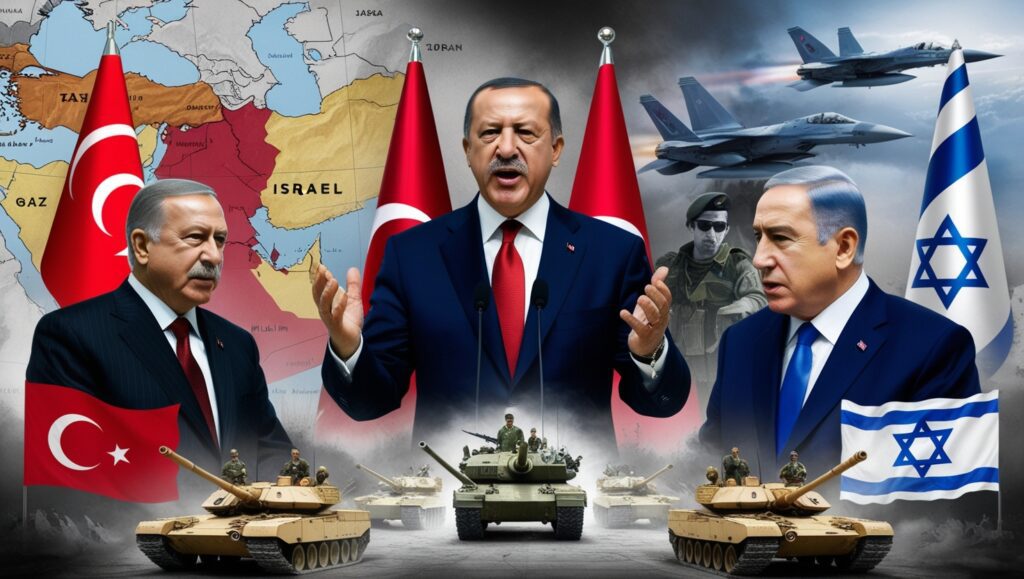Introduction: Recently, Turkish President Recep Tayyip Erdoğan made a statement that has sparked significant interest in the Muslim-majority countries. Erdoğan proposed the formation of an Islamic military alliance to counter Israel, a concept that has been widely discussed online and in political circles. This idea has gained traction among people, if not necessarily governments, from many Muslim-majority nations.
If this idea materializes, it would represent one of the most significant geopolitical developments in the past 50 years, potentially reshaping the balance of power in the Middle East and beyond.
Erdoğan’s Vision: President Erdoğan’s proposal comes in response to Israel’s ongoing military actions in Gaza. He has openly criticized Israel’s military, which, according to him, has resulted in the deaths of many civilians. The images emerging from Gaza have been disturbing, leading many in Muslim-majority countries to question who would protect them if Israel were to turn its attention toward their nations.
Several Western countries, including the United States and many European nations, continue to support Israel openly. However, countries like the UK, Spain, and Italy have begun to distance themselves from Israel, halting weapons exports due to their disapproval of the situation. Despite this, Erdoğan believes that Israel’s expansionist ambitions will not stop at Gaza and could threaten the stability of the entire region.
Greater Israel Concept: Erdoğan’s concerns are rooted in the idea of a “Greater Israel,” a concept that has been supported by various political figures, including former US President Donald Trump. This concept involves expanding Israel’s territorial control beyond its current borders, which could further escalate tensions in the region.
In a previous video that garnered millions of views, the topic of Greater Israel was discussed, with Erdoğan expected to take some initiative to counter this potential expansion. The formation of an Islamic alliance could be one such initiative.
Potential Members of the Islamic Military Alliance: If such an alliance were to form, the participation of key countries would be crucial. According to the Global Firepower Index, Turkey and Pakistan rank as the 8th and 9th most powerful militaries in the world, respectively. However, the likelihood of Pakistan sending a significant military contingent to defend borders near Israel or fight Israeli forces seems slim, given the potential threat from India. Pakistan would likely prioritize its defense against India in such a scenario.
For Pakistan to play a larger role in this alliance, wealthy Islamic countries would need to fund the expansion of its military, taking advantage of Pakistan’s large population. This could enable Pakistan to send additional forces to the region if necessary.
Turkey’s Leading Role: Turkey, as the most powerful Muslim-majority country today, would likely take the lead in this alliance. Other countries that might participate include Iran and potentially Egypt, although Egypt’s current government is heavily influenced by the US. Saudi Arabia and Algeria, despite their size, are unlikely to play a significant role in damaging Israel.
Saudi Arabia, in particular, relies heavily on the US for its security, making it unlikely to take aggressive action against Israel. Therefore, the alliance would primarily consist of Turkey, Pakistan, Iran, and possibly Egypt, depending on political developments in the region.
Is a Military Alliance Possible? While the idea of a military alliance may seem far-fetched to some, it is entirely possible, especially given the unity among Islamic countries on key issues. In 2015, for example, the Islamic Military Counter Terrorism Coalition was formed, consisting of 42 Muslim-majority countries, including Pakistan. This coalition was created to combat terrorism, with its headquarters in Riyadh, Saudi Arabia, and its leadership under Pakistan’s General Raheel Sharif.
If a similar alliance were to form, it would likely be led by a general from either Turkey or Pakistan, given their military experience.
Future Prospects: The likelihood of this alliance forming will depend heavily on future geopolitical events. If Donald Trump were to win the next US election and Israel were to escalate its aggression in Gaza and the West Bank, the formation of an Islamic military alliance could become a reality. In such a scenario, the alliance would likely take action against Israel, marking one of the most significant geopolitical developments in recent history.
Impact on India: This development would also have implications for India. If a military conflict were to arise between India and Pakistan in the future, the role of this Islamic alliance could come into play, further complicating the situation.
Conclusion: Erdoğan’s proposal for an Islamic military alliance is a bold idea that, if realized, could reshape the geopolitical landscape in the Middle East and beyond. The potential for such an alliance to form and take action against Israel is a topic that will continue to generate significant attention in the coming years.

